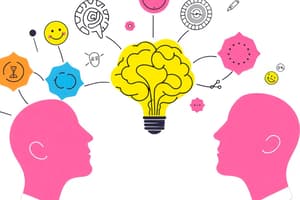Podcast
Questions and Answers
ما الذي يتضمنه التفكير النقدي؟
ما الذي يتضمنه التفكير النقدي؟
- الاستنتاجات الاحتمالية
- الاعتماد على التحكم الشخصي
- البحث عن وجهات نظر متنوعة (correct)
- تحليل العواطف بدقة
ما هي أربعة مكونات رئيسية للتفكير النقدي؟
ما هي أربعة مكونات رئيسية للتفكير النقدي؟
- المنطق الاستدلالي، تحليل السبب والنتيجة، التفكير التصاعدي، والتفكير الاحتمالي (correct)
- تحليل البيانات، التفكير الإبداعي، التقدير السابق، والمنطق المقدمي
- تحليل المشاعر، تقدير الوجهات المختلفة، الرؤية المسبقة، والاحتمالات
- المنطق الاستقرائي، تحليل العوامل، التقدير التصاعدي، والتفكير الاحتمالي
ما هو دور تحليل العواطف في عملية اتخاذ القرارات؟
ما هو دور تحليل العواطف في عملية اتخاذ القرارات؟
- إثراء التجارب الشخصية
- زيادة التأثير الشخصي
- إهمال التأثير العاطفي في اتخاذ القرارات (correct)
- تحسين القدرة على اختيار أفضل البدائل
ما هو دور التفكير النقدي في حياتنا اليومية؟
ما هو دور التفكير النقدي في حياتنا اليومية؟
ما هي أهمية فهم جوانب التفكير المختلفة؟
ما هي أهمية فهم جوانب التفكير المختلفة؟
ما هو التشابه بين عملية اتخاذ القرارات وعملية التفكير النقدي؟
ما هو التشابه بين عملية اتخاذ القرارات وعملية التفكير النقدي؟
ما المقصود بعملية اتخاذ القرار؟
ما المقصود بعملية اتخاذ القرار؟
ما الفرق بين قرارات البرمجة والقرارات المعقدة؟
ما الفرق بين قرارات البرمجة والقرارات المعقدة؟
ما هو تعريف التفكير النقدي؟
ما هو تعريف التفكير النقدي؟
ما هو دور فهم الوضع في صناعة قرار فعّال؟
ما هو دور فهم الوضع في صناعة قرار فعّال؟
ما هي إحدى مزايا صانعي القرار الفعّال؟
ما هي إحدى مزايا صانعي القرار الفعّال؟
ما هو تعريف التفكير؟
ما هو تعريف التفكير؟
Flashcards are hidden until you start studying
Study Notes
Thinking: Understanding Decision Making and Critical Thinking
Thinking is a fundamental aspect of human life, encompassing various cognitive processes such as problem solving, reasoning, memory, perception, and creativity. This article focuses specifically on two key aspects of thinking: decision making and critical thinking.
Decision making refers to the process of choosing among several alternatives based on available information. It involves identifying options, evaluating their potential outcomes, and selecting the best course of action given the circumstances. There are three main types of decisions: programmed, simple, and complex. Programmed decisions involve routine tasks where there's little room for judgment. Simple decisions require basic information processing skills, while complex decisions demand more sophisticated strategies.
Key factors influencing effective decision making include understanding the situation, considering all relevant information, anticipating consequences, assessing risks, and making trade-offs when necessary. Effective decision makers also tend to be open-minded, willing to consider alternative viewpoints, and able to learn from past experiences. However, even with these skills, human decision making can still fall prey to various biases and heuristics, leading to suboptimal choices.
Critical thinking, on the other hand, involves analyzing arguments, assessing evidence, making sound judgments, and drawing reasonable conclusions. It requires evaluating information objectively and rationally without being influenced by emotions or personal biases. Critical thinkers seek out diverse perspectives and debate them constructively, aiming to strengthen their own understanding. They employ active listening, ask thoughtful questions, and appreciate opposing views.
There are four major components of critical thinking: propositional logic, causal analysis, deductive reasoning, and probabilistic reasoning. Propositional logic deals with statements' truth values, causal analysis identifies cause-effect relationships, deductive reasoning deduces conclusions from premises, and probabilistic reasoning estimates likelihoods.
In conclusion, thinking encompasses a wide range of cognitive processes, including decision making and critical thinking. Both are crucial for navigating everyday life and making informed choices in various domains. While decision making involves choosing the best option from multiple alternatives, critical thinking requires evaluating arguments objectively and rationally. By understanding these aspects of thinking, we can improve our ability to analyze situations, make informed decisions, and engage in constructive discussions.
Studying That Suits You
Use AI to generate personalized quizzes and flashcards to suit your learning preferences.




